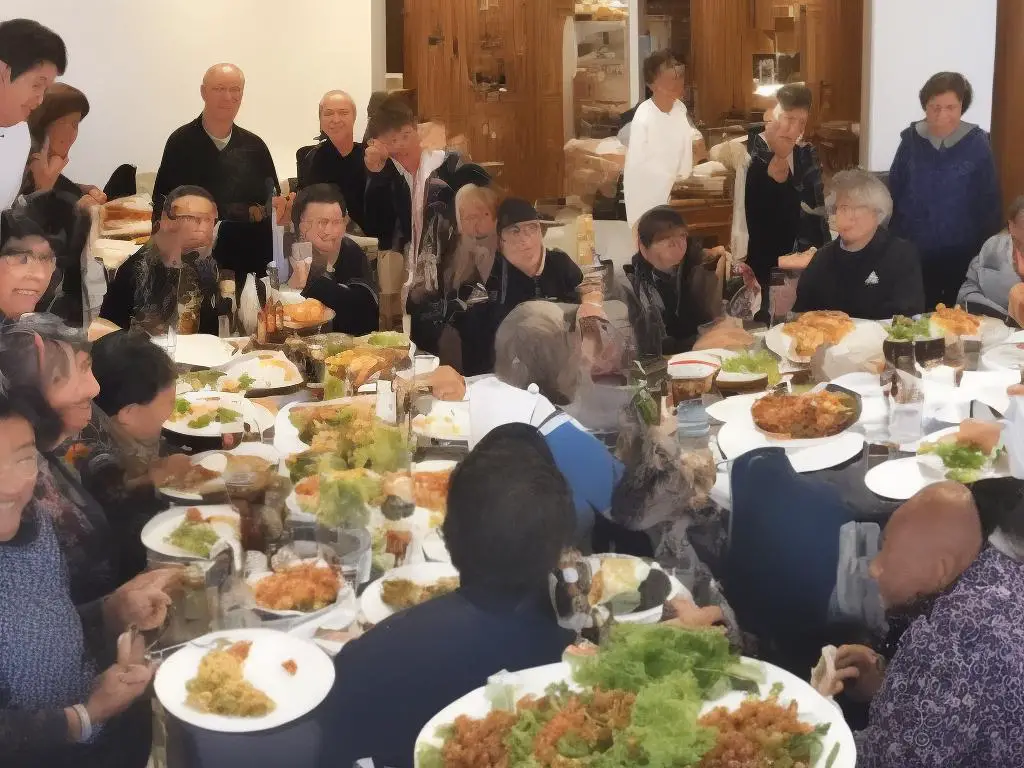In an increasingly diverse world, marked by a myriad of religious beliefs and non-beliefs, understanding how to navigate spaces dominated by religious events is crucial. The significance of these religious gatherings in various cultures and societies is often profound and these events invariably demand immense respect. However, there may be instances where individuals, due to their personal beliefs or discomfort, might find it challenging to partake in these events. Navigating such scenarios requires both empathy and assertiveness. Regardless of whether one’s reasons for abstention stem from atheism, agnosticism, or differing religious beliefs, it is essential to handle these situations with tact and consideration.
Understanding the importance of religion in social gatherings
Significance of Religion in Social Gatherings
Religions across the world have various means of expressing faith and spirituality, many of which involve communal gatherings or functions. These events often carry deep-rooted historical importance and cultural significances that make them primary elements in many societies. In multicultural situations, these gatherings become platforms where various traditions, beliefs, and values are demonstrated and shared.
In many cases, the act of participating in a religious event is often considered a sign of respect and acceptance of the faith or belief associated with that religion. This perception is particularly significant in tightly knit communities where religious gatherings are cornerstones of the social fabric. Activities such as worship services, weddings, funerals, or celebrations all provide opportunities for communities to come together and affirm their collective beliefs.
Personal Beliefs and Religious Events
While religious events are essential social tools for communities to reaffirm their shared beliefs, personal philosophical differences may render participation problematic for some individuals. These personal beliefs could be founded on religious differences, secularism, agnosticism, atheism, or humanism, among others.
Coming from a different religious tradition, an individual might feel hesitant or uncomfortable participating in a religious ceremony embedded with unfamiliar rites or rituals. Similarly, secular-minded individuals might feel out of place in settings where religious beliefs are given primary importance. These internal conflicts could deter individuals from attending religious events despite societal pressures and expectations.
Excusing Yourself from Religious Events
When faced with religious events, finding the right way to excuse oneself gracefully and respectfully is crucial to maintain harmony in relationships and within the larger community. The first step is acknowledging the importance of these events in the lives of those who adhere to the religion. Showing empathy and understanding towards the attendees’ beliefs and traditions can ease the process of excusing oneself.
The second step is to vocalize your reasons with assertion, yet mindfulness. The goal here is to ensure that you communicate your reasons for non-participation without demeaning or disregarding the other person’s belief system.
However, it’s worth noting that it’s not always necessary to provide a detailed rationale for your decision. A simple explanation that you feel uncomfortable attending due to personal beliefs, or that you prefer to maintain your understanding of religion in private, may suffice.
Lastly, consider offering alternatives for how you can contribute to the gathering without compromising your beliefs. This could include offering to help with non-religious aspects of the gathering like food preparation or setup.
Understanding the Religious Landscape
The cultural diversity of the United States extends greatly to religious beliefs, posing unique challenges when individuals seek to excuse themselves from religious events. To maintain harmony and support the nation’s dedication to freedom of belief, one must strike a careful balance. While it’s crucial to uphold personal convictions, it’s equally important to demonstrate respect for the religion in question and its adherents.

Reasons for abstaining from religious events
Embracing Diversity In Religious Beliefs and Practices
America, a country diverse in its geography, is also vastly heterogeneous in its religious and cultural makeup. From frequently collected census data, a clearer image of the nation’s shifting religious landscape has taken shape, showing traditional major religions co-existing alongside a growing assortment of other belief systems.
Religious pluralism, encompassing major world religions as well as individual spiritual philosophies, is integral to American society. Alongside this spectrum of faiths, we see a steady increase in people identifying as atheist, agnostic or unaffiliated. As such, religious events in the U.S. represent a cross-section of various practices and beliefs, illustrating the rich tapestry of American religious diversity.
Religious Events Participation: A Personal Decision
The increasing religious diversity resonates within the realm of religious events. Whether to participate or abstain from such gatherings becomes a personal choice, often influenced by one’s affiliation or non-affiliation to a particular faith, belief system, or philosophy.
One major reason why individuals might wish to excuse themselves from religious events is if they identify as atheists or agnostics. For such individuals, participation in these events may not resonate with their personal beliefs, leading them to opt out. Conversely, those who are believers but affiliated with a different faith might also wish to abstain from participating in religious events that do not align with their own practices and beliefs.
Uncomfortability and Lack of Understanding: Other Valid Reasons
The degree of understanding and familiarity one has with the religious practices being conducted might shape their decision to participate. If the individual lacks comprehensive knowledge or feels uncomfortable about the rituals and practices involved, they might choose to excuse themselves from the event.
For instance, if a Christian is invited to a Hindu religious ceremony, they might not be familiar with the customs or rituals involved and thus feel uncomfortable participating. They might opt to politely excuse themselves to avoid causing any inadvertent disrespect due to unfamiliarity with the practices.
Emphasizing Respect and Understanding in the Act of Abstaining
Importantly, the act of excusing oneself from a religious event should be communicated in a respectful manner, conveying the utmost regard for the other individual’s beliefs. This is true irrespective of whether the individual abstaining is an atheist, agnostic, or of a different religious belief. With respect and open-mindedness at the crux of these discussions, navigating such scenarios can promote interfaith dialogue, fostering a society marked by mutual acceptance and understanding.
Living in a society as diverse as America, one often encounters a multitude of religious events, each steeped in a unique belief structure. Choosing to partake in or excuse oneself from these events is a highly personal decision. The challenge lies not only in making this decision but also in conveying it while maintaining an environment of mutual respect and understanding. This is particularly valuable in fostering open and healthy discussions about religious diversity.

Considerate ways to decline an invitation to a religious event
Bridging Gaps Through Respectful Communication
In the context of the multicultural and pluralistic fabric of America, it’s no surprise to be invited to religious events practiced by varying faith traditions. Perhaps a co-worker invites you to a Friday mass, a friend extends an invitation to partake in a Bar Mitzvah, or a neighbor welcomes you to join an Islamic Eid celebration. Given the rich diversity of beliefs that make up our society, navigating these situations requires adept communication, deeply rooted in respect and understanding. Successfully conducting this dialogue hinges on recognizing and appreciating the significance of the religious event to the person inviting you, regardless of whether one chooses to attend or not.
Setting Personal Boundaries
While attending religious events of other faiths could serve as a rich learning experience and a chance to broaden our horizons, it might not always be comfortable or agreeable due to personal convictions. In these instances, setting personal boundaries becomes necessary. However, setting boundaries does not mean creating barriers. It is crucial to deliver your decision in a manner that could sustain the relationship while maintaining your integrity.
Start by expressing your gratitude for the invite and acknowledge the significance of the event. Ensure that your declining the invitation does not seem to invalidate the importance of the event for the person who invited you. You could say something like, “I appreciate your invitation and understand the significance this event holds for you. It’s heartwarming to see how devoted and passionate you are about your faith…
“
Delivering the Message
Once you’ve expressed your gratitude, move to the reason for your decline. You might not want to disclose your religious beliefs, but it’s important to be honest and forthright. Statements such as, “I unfortunately cannot attend this religious event that is very close to your heart…
“, “While I appreciate your kind offer, I would feel more comfortable not participating in religious ceremonies…
“, or “Due to certain personal beliefs and principles, I am unable to attend…
” are considerate ways to convey your decline.
Building and Maintaining Relationships
The most crucial factor to remember while declining a religious event invite is to ensure that your decision doesn’t affect your relationship with the inviter. Make it known that you’re open to meeting and interacting in a non-religious setting. This could range from a casual lunch to a coffee date, or even participating in a charity event together.
It’s important to understand that religion is a deeply personal matter, requiring both sensitivity and respect when being discussed. A harmonious coexistence in a multi-religious society is the responsibility of all its members. Hence, it’s essential to use these strategies not only to gracefully decline religious invites but also to contribute to a more tolerant, understanding, and congenial society.

Photo by cristina_gottardi on Unsplash
Case studies and Personal experiences
Case Study 1: Overcoming the Wedding Dilemma – Sheila’s Story
Take Sheila, for instance. She is a Christian residing in a small suburban town in Texas. When she received an invitation to her Muslim coworker’s wedding, which was to be an Islamic ceremony taking place at a local mosque, she felt uncomfortable. The discomfort stemmed from her unfamiliarity with the customs and traditions associated with such an event which caused her to consider politely excusing herself from attending.
Instead of declining right away, she decided to discuss her concerns openly with her coworker. Her coworker not only praised her honesty but also offered to educate her on what she could expect at the ceremony and the etiquette to be followed. This open dialogue proved enlightening for both parties. It helped alleviate Sheila’s concerns and made her comfortable enough to accept the wedding invitation.
Case Study 2: John’s Christmas Eve Incident
John, a devout Jew, was stationed in a company that predominantly celebrates Christmas. When the company decided to hold a Christmas Eve dinner in a church, John found himself in a tough situation. He did not wish to offend his colleagues, but his beliefs do not align with Christian traditions.
John decided to have a candid discussion with his manager, explaining his position. In response, the manager shifted the venue to a neutral location, demonstrating considerable respect for religious diversity.
Case Study 3: Laura’s Multiple Event Scenario
Laura, an atheist, resides in a neighborhood deeply rooted in religious activity. Consequently, she frequently gets invitations to religious ceremonies of various faiths. Instead of avoiding her neighbors or pretending to be away during such events, Laura decided to be forthright about her beliefs.
To her surprise, her neighbors not only respected but appreciated her honesty. They continued to invite her to non-religious commemorations and community gatherings instead.
Personal Experience: Alan’s Buddhist Retreat
Alan, a Catholic, had a great relationship with his Buddhist friend. When Alan’s friend invited him to a weeklong silent Buddhist retreat, he felt caught between wanting to support his friend and retaining his own religious identity.
After careful consideration, Alan shared his sentiments with his friend. The response was an understanding one. They decided that Alan could briefly attend the retreat’s opening ceremony to express support but not participate in the event’s entirety, catering to both parties’ feelings.
Personal Experience: Nadia and the Catholic Funeral
Nadia, a Muslim, was invited to attend a Catholic funeral. Unfamiliar with the proceedings and rules, she feared she might inadvertently disrespect the solemn affair.
Instead of declining the invitation outright or potentially causing unintended offense, Nadia opted for research. She learned about the customs and etiquette of a Catholic funeral, which she followed respectfully during the event. This approach allowed Nadia to find a comfortable and respectful solution that allowed her to provide moral support at the solemn occasion.
These cases offer practical examples of how open dialogue, respect for others’ beliefs, and proactive steps can help address discomfort or uncertainty surrounding involvement in religious events.

Bearing witness to varied personal experiences and case studies paves the way for us to understand the complexity of this issue. Individuals striving to navigate this landscape face numerous challenges, each unique in its own right. Recognizing these myriad experiences allows us to grow in empathy towards those who grapple with these scenarios. Moreover, it offers us an opportunity to understand and develop practical, respectful strategies to decline religious invitations while maintaining personal integrity and preserving relationships. In a world rich with religious diversity, the ability to balance personal beliefs with respect for others’ religious practices is not just a necessity but a hallmark of an inclusive society.

Recent Comments